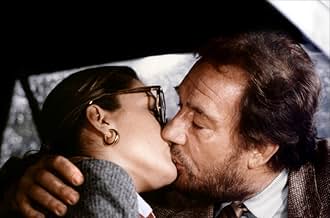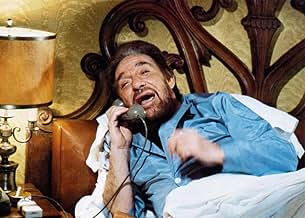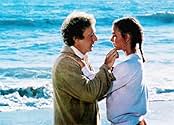Antología de comedias sexuales que contiene cuatro historias, cada una de un país diferente (Inglaterra, Francia, Estados Unidos e Italia).Antología de comedias sexuales que contiene cuatro historias, cada una de un país diferente (Inglaterra, Francia, Estados Unidos e Italia).Antología de comedias sexuales que contiene cuatro historias, cada una de un país diferente (Inglaterra, Francia, Estados Unidos e Italia).
Liù Bosisio
- (segment "Armando's Notebook")
- (as Liu Bosisio)
Rossana Podestà
- Clara (segment "Armando's Notebook")
- (as Rossana Posta)
George Hilsdon
- Hotel receptionist (segment "An Englishman's Home")
- (as George Hillsden)
Argumento
¿Sabías que...?
- CuriosidadesNever released in cinemas in the UK.
Reseña destacada
Well, if having four reviews on IMDb doesn't say anything about a film, I don't know what it does. Now, how could an anthology 'seduction' film starring such notable faces as Roger Moore, Lino Ventura, Gene Wilder and Ugo Tognazzi could sink into oblivion that way and not even reach cult status? Well, the answer is simple: blame it on the American segment.
Directed, written and starring Gene Wilder, "Skippy" is one of the most atrociously dull and nonsensical things I've ever watched, and God knows I gave it many chances. That film killed all the charm built by the precedent stories (the English and the French one) and thankfully, the Italian story redeemed the whole thing and allowed the anthology to end on a more uplifting note.
(It's worth noticing that the French version of the film ends with the Italian film, directed by Dino Risi and it is the right move: the film has an old-fashioned Italian charm, pretty faces, a great deal of gags and a not-so washed-up playboy played by Ugo Tognazzi, but for some reason, the English version ends with the dreadful "Skippy" and my advice is simple: skip it and pretend there are only three movies.)
I don't know why I'm so "interested" in this anthology, maybe because I discovered it when I was 11, with my father, it was one of these Saturday evenings where the main channel programmed comedies. When the opening credits started with the four split screens, I remember the thrills of my father who was familiar with all the four leading actors, while the only one I knew was Gene Wilder. I remember I was excited to watch his segment, the other screens showed the three men in serious postures but Wilder was savagely dancing and moving around and I was positive it would be the funniest story.
Talk about being misled.
Now, what is the film about? It tells four separate stories of middle-aged men who are still capable of seduction and are thrown in situations where they more-or-less willingly test their sex-appeal, and provide us examples of seduction the English/French/Italian/mental patient style.
Directed by Bryan Forbes, "An Englishman's Home" features Roger Moore as Harry, a castle owner's chauffeur who takes advantage of his boss' absence to pretend to be him and get himself a stewardess for the weekend. The flight attendant he meets is a Canadian played by Priscilla Barnes and the first part consists of playful pretensions with the complicity of the butler played by the irreplaceable Denholm Elliott. The second part follows the ensuing complication when an old mistress played by Lynn Redgrave comes to the castle. Much to Harry's luck, the Canadian still lives under her country's timeline and is dumb enough to think of Dr. Jekyll and Mr. Hyde as separate persons. And while playing a fairly intelligent lady, Redgrave is thankfully oblivious to the house on-goings.
Moore hams it up enough to get out of his James Bond 'tough guy' image and if the ending is cute picture, it makes you wonder if it was worth all these vaudevillian shticks. Not the best story but a pleasant warm-up enhanced by the hemistry between Moore with Elliott..
"The French Method" is the strongest bit and the best acted, you can trust French comedy not to rely on cheap gags and farcical stunts. It's about a businessman played by the no-nonsense Lino Ventura whose American potential partner (played by Robert Webber) asks him to invite Christine, a pretty intern (Catherine Salviat) for dinner. The message is clear: allow me a nice time with that woman and I might not get in touch with your competitors. The Webber character is closer to Roger Moore's Harry and it's interesting to see Ventura, an actor known for his reluctance to play in romances or sex-themed films, to get himself mixed up in a sordid bargain that makes him feel like pimping rather doing business.
And so we follow the hard-nosed and morally conflicted boss getting a dress for Christine, telling his wife he's doing so, and well, getting along with the scheme. It's not funny in a 'haha' way but because Ventura plays the part straight and you can see his feelings evolving and leading up to a bad-ass epiphany that ties the plot together. The film was written by Francis Veber and directed by Edouard Molinaro and on its own, is a solid short story. And my father and I quite enjoyed it.
This is where it went totally downhill with the "Skippy" part, funny it wasn't if you think as funny the sight of a middle-aged man gesticulating like a monkey to impersonate Travolta or having long interminable interactions with a half-naked Kathleen Quinlan. That segment tries to be many things at once, among them a soft core skin flick accompanied by piano music in the background and a weird flashback that is so cringe-worthy it made the story unbearable to watch... and it's a shame that the most comical of the four actors had to provide the unfunniest and worst segment of all.
Anyway, the last segment "Armando's Notebook" erased that experience. It's about a fifty-something old wolf who finds an old notebook full of phone numbers and when he tries to contact his old conquests during his wife's absence, he realizes that time had quite an effect on women: some got uglier, some more intellectual, and I won't spoil all the gags but let's say that the most hilarious one features a wedding. And the ending is perhaps the closest to an Aesop.
While not preachy, the films center on the male gaze and are certainly dated by the way they treat women (ironically, the "Skippy" one is the less hurtful) but I wish "Sunday Lovers" had at least a chance to be labeled dated because it's worth giving it a try, but I won't say that enough: just skip "Skippy".
Directed, written and starring Gene Wilder, "Skippy" is one of the most atrociously dull and nonsensical things I've ever watched, and God knows I gave it many chances. That film killed all the charm built by the precedent stories (the English and the French one) and thankfully, the Italian story redeemed the whole thing and allowed the anthology to end on a more uplifting note.
(It's worth noticing that the French version of the film ends with the Italian film, directed by Dino Risi and it is the right move: the film has an old-fashioned Italian charm, pretty faces, a great deal of gags and a not-so washed-up playboy played by Ugo Tognazzi, but for some reason, the English version ends with the dreadful "Skippy" and my advice is simple: skip it and pretend there are only three movies.)
I don't know why I'm so "interested" in this anthology, maybe because I discovered it when I was 11, with my father, it was one of these Saturday evenings where the main channel programmed comedies. When the opening credits started with the four split screens, I remember the thrills of my father who was familiar with all the four leading actors, while the only one I knew was Gene Wilder. I remember I was excited to watch his segment, the other screens showed the three men in serious postures but Wilder was savagely dancing and moving around and I was positive it would be the funniest story.
Talk about being misled.
Now, what is the film about? It tells four separate stories of middle-aged men who are still capable of seduction and are thrown in situations where they more-or-less willingly test their sex-appeal, and provide us examples of seduction the English/French/Italian/mental patient style.
Directed by Bryan Forbes, "An Englishman's Home" features Roger Moore as Harry, a castle owner's chauffeur who takes advantage of his boss' absence to pretend to be him and get himself a stewardess for the weekend. The flight attendant he meets is a Canadian played by Priscilla Barnes and the first part consists of playful pretensions with the complicity of the butler played by the irreplaceable Denholm Elliott. The second part follows the ensuing complication when an old mistress played by Lynn Redgrave comes to the castle. Much to Harry's luck, the Canadian still lives under her country's timeline and is dumb enough to think of Dr. Jekyll and Mr. Hyde as separate persons. And while playing a fairly intelligent lady, Redgrave is thankfully oblivious to the house on-goings.
Moore hams it up enough to get out of his James Bond 'tough guy' image and if the ending is cute picture, it makes you wonder if it was worth all these vaudevillian shticks. Not the best story but a pleasant warm-up enhanced by the hemistry between Moore with Elliott..
"The French Method" is the strongest bit and the best acted, you can trust French comedy not to rely on cheap gags and farcical stunts. It's about a businessman played by the no-nonsense Lino Ventura whose American potential partner (played by Robert Webber) asks him to invite Christine, a pretty intern (Catherine Salviat) for dinner. The message is clear: allow me a nice time with that woman and I might not get in touch with your competitors. The Webber character is closer to Roger Moore's Harry and it's interesting to see Ventura, an actor known for his reluctance to play in romances or sex-themed films, to get himself mixed up in a sordid bargain that makes him feel like pimping rather doing business.
And so we follow the hard-nosed and morally conflicted boss getting a dress for Christine, telling his wife he's doing so, and well, getting along with the scheme. It's not funny in a 'haha' way but because Ventura plays the part straight and you can see his feelings evolving and leading up to a bad-ass epiphany that ties the plot together. The film was written by Francis Veber and directed by Edouard Molinaro and on its own, is a solid short story. And my father and I quite enjoyed it.
This is where it went totally downhill with the "Skippy" part, funny it wasn't if you think as funny the sight of a middle-aged man gesticulating like a monkey to impersonate Travolta or having long interminable interactions with a half-naked Kathleen Quinlan. That segment tries to be many things at once, among them a soft core skin flick accompanied by piano music in the background and a weird flashback that is so cringe-worthy it made the story unbearable to watch... and it's a shame that the most comical of the four actors had to provide the unfunniest and worst segment of all.
Anyway, the last segment "Armando's Notebook" erased that experience. It's about a fifty-something old wolf who finds an old notebook full of phone numbers and when he tries to contact his old conquests during his wife's absence, he realizes that time had quite an effect on women: some got uglier, some more intellectual, and I won't spoil all the gags but let's say that the most hilarious one features a wedding. And the ending is perhaps the closest to an Aesop.
While not preachy, the films center on the male gaze and are certainly dated by the way they treat women (ironically, the "Skippy" one is the less hurtful) but I wish "Sunday Lovers" had at least a chance to be labeled dated because it's worth giving it a try, but I won't say that enough: just skip "Skippy".
- ElMaruecan82
- 4 ago 2021
- Enlace permanente
Selecciones populares
Inicia sesión para calificar y añadir a tu lista para recibir recomendaciones personalizadas
- How long is Sunday Lovers?Con tecnología de Alexa
Detalles
Taquilla
- Recaudación en Estados Unidos y Canadá
- 621.931 US$
- Recaudación en todo el mundo
- 621.931 US$
Contribuir a esta página
Sugerir un cambio o añadir el contenido que falta

Principal laguna de datos
By what name was Los seductores (1980) officially released in Canada in English?
Responde























